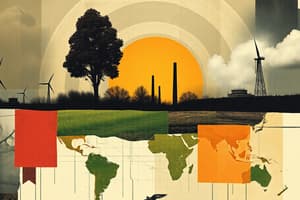Podcast
Questions and Answers
What type of crops are used to produce second-generation biofuels?
What type of crops are used to produce second-generation biofuels?
- Genetically modified crops
- Transgenic crops
- Food crops like wheat and corn
- Non-food crops like cellulosic biomass (correct)
Which of the following is a potential source of waste biomass for second-generation biofuels?
Which of the following is a potential source of waste biomass for second-generation biofuels?
- Sugarcane bagasse
- Wheat and corn stalks (correct)
- Food waste
- All of the above
What is the primary environmental benefit of second-generation biofuels compared to traditional biofuels?
What is the primary environmental benefit of second-generation biofuels compared to traditional biofuels?
- Lower production costs
- Reduced greenhouse gas emissions
- Increased energy density
- Less land competition with food crops (correct)
What type of biofuels are produced from cellulosic biomass?
What type of biofuels are produced from cellulosic biomass?
Which of the following is NOT a potential advantage of second-generation biofuels?
Which of the following is NOT a potential advantage of second-generation biofuels?
What is the primary source of biodiesel production in the 1st generation?
What is the primary source of biodiesel production in the 1st generation?
Which of the following biofuel generations does not involve the use of edible biomass?
Which of the following biofuel generations does not involve the use of edible biomass?
What is the primary difference between the 2nd and 3rd generation of biofuels?
What is the primary difference between the 2nd and 3rd generation of biofuels?
Which of the following is not a characteristic of the 4th generation of biofuels?
Which of the following is not a characteristic of the 4th generation of biofuels?
What is the common theme among the different generations of biofuels?
What is the common theme among the different generations of biofuels?
What is a primary characteristic of biofuels in terms of their origin?
What is a primary characteristic of biofuels in terms of their origin?
Which of the following is not a potential benefit of using biofuels?
Which of the following is not a potential benefit of using biofuels?
What is the primary source of biofuels?
What is the primary source of biofuels?
Which of the following is a potential environmental impact of biofuels?
Which of the following is a potential environmental impact of biofuels?
What is a common use of biofuels?
What is a common use of biofuels?
Flashcards are hidden until you start studying
Study Notes
Biofuels Overview
- Biofuels are energy sources made from living things or waste that living things produce.
Types of Biofuels
- There are four generations of biofuels.
1st Generation
- Produced from edible biomass (crops).
- Used for biodiesel production from vegetable oils, yellow grease, used cooking oils, or animal fats.
2nd Generation
- Produced from non-food crops, such as cellulosic biofuels and waste biomass (e.g., wheat and corn stalks, wood).
3rd Generation
- Algal biomass is used, which involves genetically engineered microorganisms.
4th Generation
- No specific details mentioned in the text.
Studying That Suits You
Use AI to generate personalized quizzes and flashcards to suit your learning preferences.




